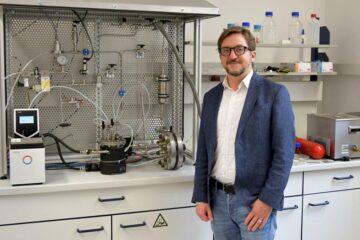New Recombinant Production of Design Rhamnolipids – Optimized Biosurfactant Fermentation Process

Biosurfactants have attracted increasing interest since they show a number of advantages over surfactants of petrochemical origin in terms of ecological acceptance, low toxicity and sustainability. Biosurfactants also have a huge application potential, for example in chemical and pharmaceutical industry or as emulsifier in cosmetics and foods.
Among the best established biosurfactants are the rhamnolipids. Rhamnolipids are glycosides with one (mono-rhamnolipid) or two rhamnose-units (di-rhamno-lipid) as the glycon portion and one to three β-hydroxy-fatty acid moieties as the aglycon portion. Rhamnolipids are naturally produced by two rhamnosyl-transferases encoded by rhlA, rhlB and rhlC by the opportunistic pathogen Pseudomonas aeruginosa. The rhlA and rhlB genes form an operon, encoding subunits A and B of rhamnosyltransferase 1, while rhlC encodes rhamnosyltransferase 2. In particular, the present invention provides a genetically modified non-pathogenic host cell that may be employed for production of favoured rhamnolipids in high yields. Use of the modified host cell allows selective production of various rhamnolipids, e.g. mono- or dirhamnolipids and a various length of fatty acids. As a first example, a bacterial host cell includes a rhlA gene, a rhlB gene or orthologs thereof. The genes are under the control of a heterologous promoter. In a further embodiment, the host cell may preferably also contain a rhlC gene, or an ortholog thereof. The biotechnical production process is in addition optimized at varying temperature conditions.
Weitere Informationen: PDF
PROvendis GmbH
Tel.: +49 (0)208/94105 10
Ansprechpartner
Dipl.-Ing. Alfred Schillert
Media Contact
Alle Nachrichten aus der Kategorie: Technologieangebote
Neueste Beiträge

Ideen für die Zukunft
TU Berlin präsentiert sich vom 22. bis 26. April 2024 mit neun Projekten auf der Hannover Messe 2024. Die HANNOVER MESSE gilt als die Weltleitmesse der Industrie. Ihr diesjähriger Schwerpunkt…

Peptide auf interstellarem Eis
Dass einfache Peptide auf kosmischen Staubkörnern entstehen können, wurde vom Forschungsteam um Dr. Serge Krasnokutski vom Astrophysikalischen Labor des Max-Planck-Instituts für Astronomie an der Universität Jena bereits gezeigt. Bisher ging…

Wasserstoff-Produktion in der heimischen Garage
Forschungsteam der Frankfurt UAS entwickelt Prototyp für Privathaushalte: Förderzusage vom Land Hessen für 2. Projektphase. Wasserstoff als Energieträger der Zukunft ist nicht frei verfügbar, sondern muss aufwendig hergestellt werden. Das…

















